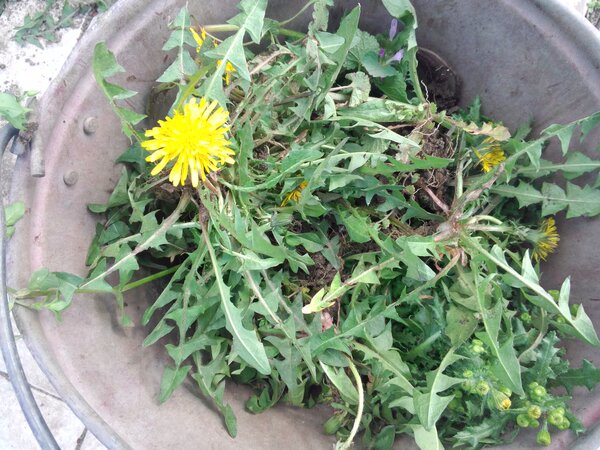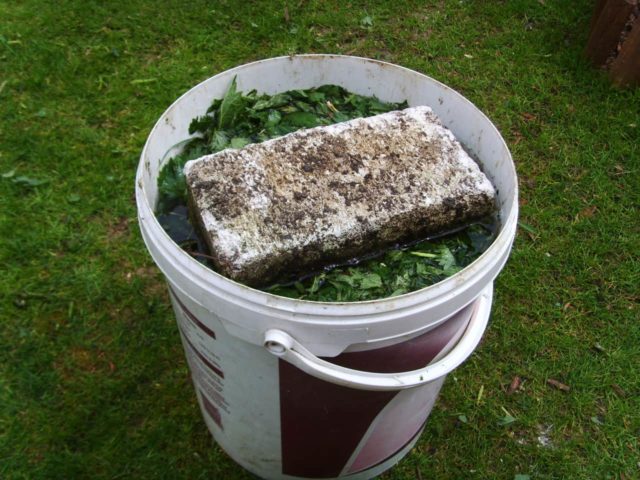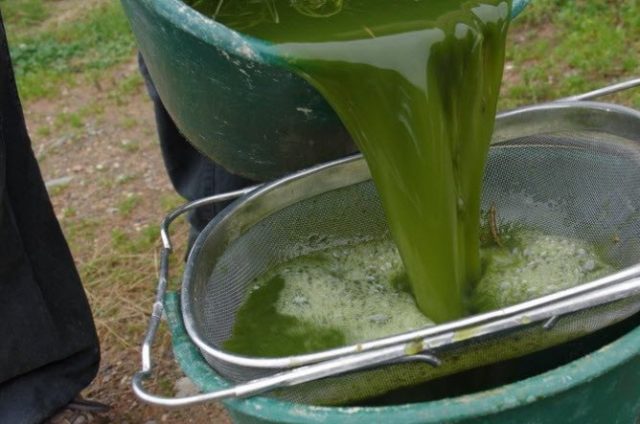Content
Dandelion fertilizer is not as well known as vitamin salad from dandelion leaves, however, this does not negate its usefulness - not only fruit garden crops, but also ornamental plants respond well to such potassium fertilization. In addition, like all weed-based solutions, dandelion fertilizer is an environmentally friendly product that can harm neither humans nor crops.
What properties does dandelion infusion have?
The benefits of dandelion feeding are due to the chemical composition of this plant. Its leaves and stems are capable of accumulating the following macro- and microelements in large quantities:
- potassium;
- phosphorus;
- calcium;
- nitrogen;
- iron;
- manganese;
- molybdenum;
- boron, etc.
All these substances, to one degree or another, are involved in the growth, flowering and fruiting of various horticultural crops. There are many ready-made industrial mineral complexes that can be used as plant nutrition, however, they all have a big drawback - most of the chemical fertilizers cannot be used during fruit setting and intensive fruiting. In this regard, liquid vermicompost based on dandelions and other weeds is much better than chemicals, however, the advantages of fertilization do not end there.
Benefits of Application
There are a number of reasons why, if possible, it is better to replace chemical fertilizers with natural ones. Dandelion fertilizer has the following benefits:
- All nutrients are absorbed by the plant very quickly and fully, which cannot be said about some components of mineral fertilizers. For example, when potassium nitrate is introduced into the soil, nitrogen is rapidly leached out of the soil.
- In addition to micro- and macroelements, dandelion infusion contains many different microorganisms that are involved in the fermentation process. Such dressing has an extremely favorable effect on the fertility of the soil.
- Liquid vermicompost is an environmentally friendly fertilizer, absolutely harmless to both plants and humans, if it is introduced into the soil according to all the rules. Too concentrated a mixture can damage the roots of plants, but this is where the potential harm ends.
- Due to the environmental friendliness of the product, it can be applied to the soil even during the formation of ovaries.
- The leaves and stems of dandelions contain phytoncides, essential oils and other compounds that have a detrimental effect on many insects, including all types of aphids. Thus, spraying plants with dandelion infusion allows not only fertilizing the planting, but also carrying out preventive treatment against pests. The solution is especially effective in repelling copperheads and aphids.
- Raw materials for infusion are very affordable material. Dandelions can be found almost anywhere.
- The dandelion solution lowers the acidity of the soil on the site, so fertilization can be used as a way to adjust the soil type.
Separately, it should be noted that such dressings are the most practical way to dispose of weeds. It is still burned after weeding or thrown away.Collecting mown dandelions for fertilization allows not only to clear the plantings from weeds, but also to get a large amount of vermicompost, moreover, completely free of charge.
What plants can be fed
The following cultures respond well to fermented dandelion infusion:
- pepper;
- tomatoes;
- White cabbage;
- cucumbers;
- Strawberry;
- roses.
In general, such fertilization is beneficial to almost all horticultural plants, however, there are a number of exceptions. It is better not to use the solution for feeding the following crops:
- bow;
- garlic;
- beet.
The substances contained in dandelion leaves inhibit the growth of these plants.
How to properly feed dandelion plants
All parts of the plant are suitable as raw materials for feeding:
- flowers;
- stems;
- roots;
- leaves.
The main thing is to thoroughly rinse everything and shake off the soil from the roots before starting to prepare the fertilizer. The infusion is prepared according to the following scheme:
- Green mass is poured into a basin, bucket or barrel. You can put both whole plants and shredded ones on the bottom. The ratio of raw materials and water should be approximately 1: 2, however, the container cannot be completely filled. There should be at least 3-5 cm from the water level to the lid, since during fermentation a lush frothy cap begins to form on the surface of the infusion.
- Stir the dandelions, cover the solution with a lid and press down with oppression.
- In order for the mixture to breathe, 3-4 holes are made in the lid.
- In this form, the container with the future fertilizer is left in the open sun for 1-2 weeks. In this case, it is better to place the solution away from residential buildings, because over time it begins to smell unpleasant.
- Stir the infusion about once every 4-5 days.
- When the fertilizer is ready, it is filtered. The cake is no longer required, the liquid is further used to feed the plants.
It is possible to increase the efficiency of fertilizers with the help of a concentrated solution of the "Gumat-Baikal" preparation. The recommended proportions of the solution are 30 g per 100 liters of water. A small amount of such a stimulating supplement can multiply the biological activity of the infusion. First, it will be easier for plants to absorb nutrients. Secondly, humates neutralize heavy metals and pesticides.
There are other options for dandelion fertilization:
- With the addition of urea or other nitrogen fertilizer. 50-100 g of the substance is poured into the solution in order to speed up the fermentation processes.
- Infusion for spraying with laundry soap. 2 tbsp. dandelion shoots are poured with 10 liters of boiling water and insisted for 2 hours. After that, 1/3 of a piece of laundry soap is added to the solution. This top dressing is used to spray plants before flowering.
- Dandelion nourishing infusion for spraying. About 1-2 kg of plant roots and shoots must be poured with 10 liters of water. Such a solution is infused for 2 weeks, decanted and introduced into the soil without additional dilution with water.
Advice! An insecticide top dressing is made from dandelion roots and leaves. To do this, you need to take 300 g of raw materials and pour all this with 10 liters of water. After 2 hours, you can spray the planting.
How to make a dandelion feed with other herbs
Dandelions can be effectively combined with many other weeds. A good fertilizer is obtained by combining the original raw material with the following herbs:
- sagebrush;
- comfrey;
- yarrow;
- chamomile;
- shepherd's bag;
- mother and stepmother;
- nettle;
- valerian;
- calendula;
- mint;
- bindweed.
In addition, stepchildren of tomatoes and overgrown green crops: spinach, mustard leaves, lettuce can be added to the fertilizer.
In combination with other herbs, the infusion is done as follows:
- All plants are plucked before they form seeds.
- Raw materials must be crushed and dried.
- Then the green mass is poured with water to 1/8 of the total volume of the container.
- At the end, you can add a diluted humate solution (1 tsp of the drug per 10 liters of water) or wood ash (10 g per 10 liters of water).
- After that, the barrel, bucket, tank or other container is tightly closed with a lid. The solution will be ready in 5-8 days.
How to determine the readiness of the solution
The readiness of the potassium solution from dandelions is calculated not only in time - sometimes the weed is infused longer than indicated in the recipe, or even ahead of all preparation times. Insufficiently infused fertilizer or, conversely, standing in the sun, is not very suitable as a full-fledged top dressing.
The color of the solution, its smell and fermentation processes are of great importance. If the fertilizer is insisted according to all the rules, taking into account all the recommendations, then after 2-3 days the solution begins to ferment. Its color becomes dirty green, the grassy mass is very bubbling. Finally, an extremely unpleasant smell of fresh cow dung begins to emanate from the fertilizer.
In 5-7 days after filling with water, the fertilizer can be applied to open ground.
How to apply correctly
The resulting dandelion infusion is not recommended to be used in its pure form, as it is too concentrated. Usually it is diluted in a ratio of 1:10, and it is desirable to use warm water that has settled in the sun. If this is not done, fertilization is likely to burn the plant roots.
Dandelion infusion is introduced into the soil under the root or sprayed with the leaves of garden crops. In the second case, it is better to carry out top dressing early in the morning or in the evening, when there is no scorching sun. In general, the fertilizer is better absorbed if the plants are fed after heavy watering or rain.
Top dressing is carried out 1 time in 3 weeks, in the period before flowering. When the fruits begin to set, the frequency of fertilization is reduced to 1 time in 2 weeks.
The peculiarities of the use of dandelion infusion should also include the rules for its storage. The most important thing is that you do not need to prepare fertilizer with a margin. Insist exactly as much as is spent on planting. This is explained by the fact that the solution very quickly loses its useful properties, especially if left in an open container in the sun. The maximum shelf life of dandelion fertilizer is 4-5 days, and then only on condition that the tank or bucket is removed in a dark, cool place and tightly closed.
Conclusion
Dandelion fertilizer can compete with many ready-made chemical products for plant nutrition. It is available, cheap and, most importantly, an environmentally friendly solution. In combination with concentrated humates, dandelion fertilization makes it completely unprofitable to use chemistry on the site - you can safely refuse it.
The only drawback of a potassium solution is the lower intensity of exposure. Dandelion supplements are somewhat weaker than industrial mineral mixtures, so you will have to apply fertilizers more often to get a lasting result.
For more information on dandelion fertilization, see the video below:











